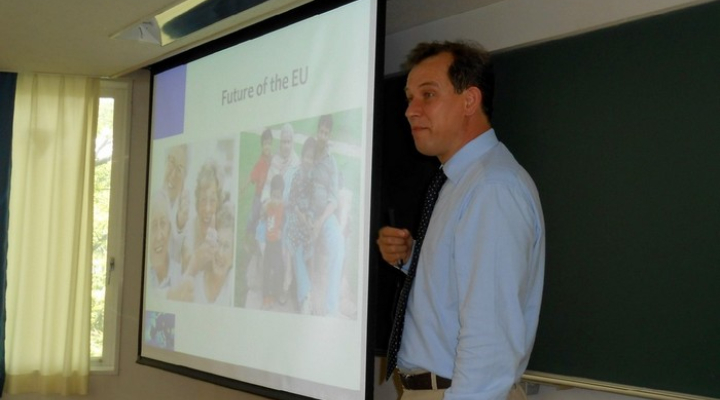Lecture held by Csaba Sógor for Japanese Political Science students
Invited by prof. Shigeo Mutsushika, the director of the Wider Europe Research Center (WERC) from Shizuoka University, during his visit to Japan Csaba Sógor, MEP on behalf of RMDSZ, held a lecture on the situation of minorities from the European Union, including that of the Hungarians from Transylvania.
WERC functions since 2008 as an associate institution of the International Relations Department of the University. Following consecutive enlargements of the European Union, in international politics beside Western Europe there is also a growing interest in the countries from the eastern part of the continent. WERC aims to enlarge its students’ knowledge on the region by inviting foreign experts.
In his presentation Csaba Sógor discussed the issue of preserving the identity of European minorities, among them that of the Hungarians from Transylvania. He showed that the Hungarians from Transylvania must fight every day for their rights, so that they would not have to give up their own language and culture. Csaba Sógor highlighted that, in contrast, the European Union is based on the idea that everyone within the same borders must enjoy the same rights. After detailing the possibilities offered by territorial autonomy, the MEP also presented the European Union’s new instruments for minority protection that are included in the founding treaties and in the Charter of Fundamental Rights. He also talked about the European Citizen’s initiative meant to encourage civil action, using the example of the initiative launched by RMDSZ. The MEP also talked about RMDSZ’s battles concerning the modification of the Romanian Constitution and the territorial reorganisation of the country, showing why the creation of strong regions in the united Europe is in the interest of minorities.
“The interest of the Japanese in Europe is due to our cultural and political heritage, to the fact that we represent an important economic factor and that we are facing similar problems, such as the aging of the population. In addition, they are interested in Eastern Europe because it is a challenging region in development and in us, Hungarians, because they consider us a related nation”, explained the MEP.











